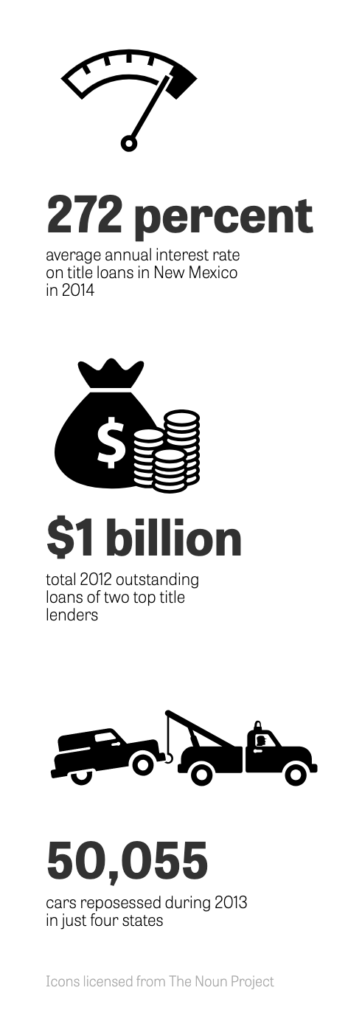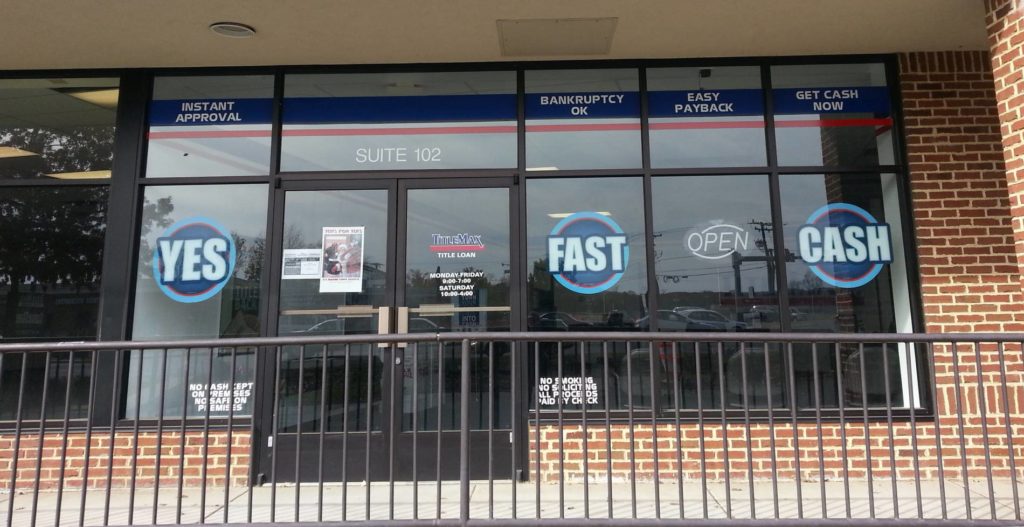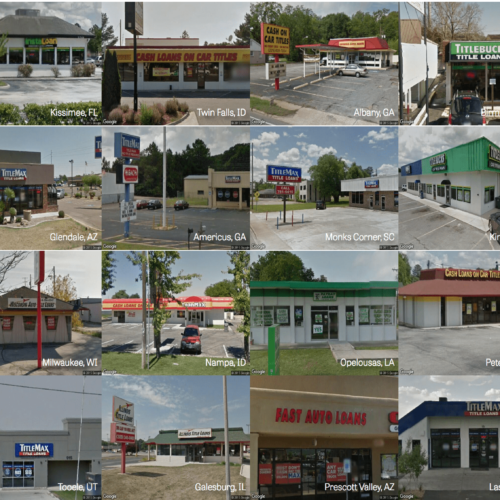This story was co-published with USA Today.
Introduction
After years of financial ups and downs, Gloria Whitaker needed some quick cash to help keep a roof over her head.
So she and her son, Devon, went to a TitleBucks store in Las Vegas and took out a $2,000 loan, pledging his gold 2002 Ford F-150 truck as collateral.
Whitaker, 66, said nobody verified she, or her jobless son, could repay the loan, which carried interest of 121.545 percent. When she paid off the loan, she said, the company didn’t give back the title to the truck. Instead, employees talked her into borrowing $2,000 more, which plunged the family deeper into debt, she said. Whitaker knows that was a mistake, but also feels misled by aggressive — and legally dubious — lending tactics.
“I had a hardship,” Whitaker said. “I was between a rock and a hard place.”
In October, Whitaker filed a complaint with state regulators, who say the giant lender, TitleMax, which operates TitleBucks, violated state lending laws and estimate that it overcharged Nevada customers more than 6,000 times this year by nearly $8 million.
“Our position is that they are a bad actor,” said George Burns, who heads the Nevada Financial Institutions Division. “We believe it is very important that we get them under control. We want them to conduct their business legally and not be taking advantage of the public.”
It’s legal in about half the states to pledge a car title as collateral for short-term loans of a few hundred dollars or more. Many of these states allow lenders to tack on interest that can top 300 percent, and to seize and sell off cars when borrowers fail to pay. Most states have either permitted the companies to operate for years, or kept them out with usury laws that cap interest rates.
Title lenders insist they provide a vital financial service to people who can’t take out a bank loan or get credit when they need fast cash.
Consumer advocates scoff at this notion. They argue title lenders prey on low-income people by putting their cars, often their biggest or sole asset, at risk. Title lenders in four states alone — New Mexico, Missouri, Tennessee and Virginia — repossessed at least 92,000 cars in the past two years, according to state records.
“The person who has paid off their car is starting to move up the ladder a little bit,” said Jay Speer, executive director of the Virginia Poverty Law Center in Richmond. Virginia is home to nearly 500 title-lending shops.
“When you get one of these loans, you are knocked right back down and in bad shape,” he said.
Yet title lenders appear to be expanding. TitleMax and two other major lending companies — all three based in Georgia — run about 3,000 stores under a slew of eye-catching brand names, such as LoanMax and Fast Auto Loans. None would comment for this article.
A Center for Public Integrity investigation found that the title lenders have fended off tighter state oversight of their operations behind millions of dollars in campaign contributions, aggressive challenges to regulators who seek to rein them in and by writing loan contracts that leave aggrieved borrowers with little legal recourse.
Among the findings:
- Three major title lenders, their owners or key executives, pumped just over $9 million into state political campaigns during the past decade, as they sought to bat down reform legislation. Since 2011, about 150 bills to cap interest rates or crack down on lending abuses died in 20 state legislatures.
- In Virginia, where the three big lenders spread about $1.5 million in campaign cash in the last decade, five reform bills died this year alone. In Tennessee, more than two dozen similar measures have failed in the past five years.
- State banking and consumer regulators have a tough time enforcing current laws, with most levying fines or other civil penalties that don’t appear to halt lending abuses. Illinois officials hit TitleMax stores with about 90 fines for more than $527,000 in the past 18 months. Some state citations accused TitleMax and other lenders of improperly writing loans with repayment terms that sucked up more than half the borrower’s monthly income.
- Federal officials are considering regulations that would require lenders to confirm their customers earn enough to repay loans. But it’s not clear if that will happen, or how strict those provisions might be.
- Title loan contracts obligate borrowers to settle disputes through confidential arbitration hearings. This has stymied dozens of lawsuits accusing lenders of a range of deceptive tactics and kept judges from interpreting consumer protection laws in a court of law.
Consumer groups and some state officials say the courts need to clarify these issues, such as what steps lenders must take to prevent people from getting in over their heads.
“It’s not a loan if you can’t repay,” said Speer, of the Virginia Poverty Law Center. “That’s loansharking. They are just trying to milk somebody for interest.”
Fine print
Whitaker, a onetime tour guide now retired, has a history of financial instability, including bankruptcies. She also admits she failed to read the contract’s fine print carefully.
“That was our biggest mistake,” she said.
Whitaker, in her complaint to the state, said her income was $1,055 a month, mostly from Social Security. Yet the first loan she took out in late 2013 obligated her to pay $265 a month.
She and her son, now 30, later took out a second $2,000 loan, even though he had no income. They signed an affidavit stating they could handle seven monthly payments of $410.68, for a total of $2,874.71.
“We did not have the ability to repay the loans, and TitleBucks knew that,” she wrote in her complaint.
(Update, Dec. 9, 2015, 11:19 a.m.: Most states don’t publish data on the average dollar value of title loans or their repayment terms. But in Virginia, the average loan term made in 2014 was for 345 days, according to the Virginia State Corporation Commission annual report. Title lenders must advise borrowers of the loan’s annual interest rate under the federal Truth-in-Lending Act.)
Like Whitaker, many borrowers realize too late how hard it is to climb out from under triple-digit interest rates, or they argue they didn’t fully understand what they were getting into.
Venicia Considine, a lawyer at the Legal Aid Center of Southern Nevada, who assisted the Whitaker family, said many borrowers with poor credit and few other options make easy prey for lenders.
“It’s very easy to say they [borrowers] are trying to game the system,” Considine said. “I think it’s easy to demonize people who don’t have a voice or a lobbyist.”
Title lenders, she said, “bleed” people “until there is nothing left. Then they get their car.”
Devon Whitaker didn’t lose his truck. After the family sought help from legal aid and filed a complaint with the state, TitleMax agreed to accept a payment of $580 and free up the title to the truck, Considine said.
Burns, the state regulator, believes some lenders charge way too much given the circumstances. He said some title loans are “almost risk-free” for lenders because they typically are made for a good deal less than the car is worth.
“If they repossess, they’ve got their costs covered,” he said. Rather than a source of quick cash, a title loan can morph into “a mortgage on their car,” he said.
Burns said he hopes his agency’s enforcement action will clarify a state law that directs lenders to review “current and expected income, obligations and employment” in assessing a borrower’s ability to repay.
‘Predatory’ loans

Warnings to steer clear of title loans date back a decade or more.
In 2005, the Center for Responsible Lending, a nonprofit group that opposes predatory lending, found that lenders often had “little or no regard to their borrowers’ ability to repay the loans.” The group noted that nearly three of four customers earned less than $25,000 a year, according to some surveys, and often rolled over their loans to keep the repo man at bay.
Also that year, the Consumer Federation of America warned that title-loan interest rates can exceed 300 percent and “trap borrowers in perpetual debt.” The group urged state lawmakers to crack down on these “predatory lenders.”
TitleMax, in a 2013 Securities and Exchange Commission filing, acknowledged its critics, adding that media exposés branding title loans as “predatory or abusive” may hurt sales at some point.
Still, TitleMax reported $577.2 million in loans outstanding as of December 2012, according to the filing. The Savannah, Georgia-based lender nearly doubled its stores from June 2011 to January 2014, reaching more than 1,300 locations.
TitleMax says it fills a void for growing legions of people banks won’t touch. Unlike banks, it doesn’t check a borrower’s credit before offering a loan or report defaults to credit bureaus.
TitleMax promises cash “in as little as 30 minutes.” The front window of a store in Charlottesville, Virginia, shouts out “instant approval” and “bankruptcy OK.”
A little more than two miles away, competitor LoanMax boasts the motto: “we say yes.” A hand-scrawled message on the store window reads: “Refer a friend. Get $100.”
Neither TitleMax nor its rivals offer any apology for the often-punishing fees they extract from those in need of surrogate banking.
How quickly the title loan market is growing, and the magnitude of profit margins, is difficult to assess. Many states either don’t try to find out if the market is growing or they keep financial data secret.
Wisconsin, for instance, requires title lenders to submit detailed sales figures, but making them public is a felony, officials said. In New Mexico, lawmakers took years to pass legislation allowing the state to collect basic statistics, such as the volume of title loans and default rates.
This much is clear: In Illinois, where three of four borrowers earned $30,000 or less per year, title loans nearly doubled between 2009 and 2013, according to the Illinois Department of Financial and Professional Regulation. California officials in July reported that title loans had more than doubled in the past three years.
Gaps in state recordkeeping also make it tough to confirm how often borrowers fail to make payments and forfeit their cars.
The Center for Public Integrity obtained records showing that in New Mexico, Missouri, Virginia and Tennessee lenders reported a total of 50,055 repossessions in 2013. The following year, the count was 42,905, not counting Tennessee, which won’t release its 2014 data until next year. In New Mexico, where interest rates average 272 percent, repossessions shot up in 2014, as they did in Virginia.
TitleMax argues that it seizes cars only as a “last resort,” not before “we have first exhausted all options for repayment,” according to an SEC filing.
Katie Grove, who spoke for the company during a March 2013 Nevada legislative hearing, said, “Our business model is to keep customers’ payments low and give them a longer time to pay off their loan so they can be successful in paying off the loan. That leads to extremely low default rates.”
But in Missouri, TitleMax repossessed a total of nearly 16,000 cars in 2013 and 2014, or about 16 percent of all loans on average, according to state records. The figures were first reported by the St. Louis Post Dispatch.
Campaign cash
When New Mexico state Sen. William P. Soules filed a bill in December 2014 to cap title loan interest at 36 percent, it quickly died.
Soules, a Democrat, called it a “very big learning experience.” He said that “without a doubt” industry lobbying and campaign contributions doomed the bill.
“There’s big money being made off the very poorest and most vulnerable people in our state,” Soules said.
Two similar bills died during the past two years, despite a poll showing 86 percent of New Mexicans favored interest rate caps. Title lenders have won the argument at least partly by complaining that rate caps would drive them out of business.
New Mexico community activist Ona Porter also blames campaign cash for thwarting rate-cap bills. “The industry has bought and paid for our politicians. They make huge contributions,” said Porter, president and CEO of Prosperity Works, which advocates for working families.
More than four dozen similar bills have stalled in statehouses nationwide, and those on the losing side also cited hardball lobbying and lavish contributions by title lenders.
A bill offered earlier this year by Democratic Missouri Rep. Tracy McCreery labeled interest rates of up to 300 percent as “excessive” and said they could “lead families into a cycle of debt.” The bill would have limited rates at 36 percent, but it never got a hearing. McCreery blamed campaign donations from lenders to politicians of both parties that totaled $200,000 during the past decade.
“It’s disgusting,” McCreery said. “The vast majority of the legislature is willing to look the other way on the need for reform.”
McCreery plans to refile the bill. “I’m not giving up,” she said.
This year in Virginia, where lenders also have spread donations liberally, bills to limit interest rates, restrict the number of loan stores in some jurisdictions, and to keep the stores at least 10 miles away from military bases, all died.
Major title lenders have given nearly half a million dollars to Virginia party organizations over the past decade. Republican groups received about twice as much as Democrats. Richard Saslaw, the Virginia Senate’s Democratic leader received $90,000 or more. Senate Majority Leader Tommy Norment, a Republican, received about $57,000.
The Center for Public Integrity tracked $9.1 million in campaign contributions by the three major Georgia-based title lenders during the past decade using state data collected by the National Institute on Money in State Politics.
The top donor is Roderick Aycox, of Alpharetta, Georgia, together with his companies and relatives, all of which gave nearly $4 million. They do business as Select Management Resources, LoanMax, Midwest Title Loans and several other brands.
TitleMax, which claims to be the nation’s biggest title lender, gave nearly $3.8 million, including donations from its executives and its president, Tracy Young.
The third big donor is Robert I. Reich, CEO of Community Loans of America in Atlanta, which has listed more than 100 subsidiaries, such as Fast Auto Loans. His firms gave more than $1.3 million.
Reich is the most visible of the three industry titans. He’s registered as a lobbyist in New Mexico and helped fight off a 2010 effort to drive title lenders out of Wisconsin. That state’s Government Accountability Board fined Reich $4,500 for exceeding limits on campaign contributions during that political skirmish.
Reich also showed up in person to talk down a move for tighter state oversight in Texas. At an April 2013 House Investments and Financial Services Committee hearing, Reich argued his company had made a “commitment” and “investment” there to “make credit available to tens of thousands of consumers without credit access.”
In 2012, Reich told the committee, his stores wrote 600,000 loans for over $533 million at more than 1,000 locations, including 300 in Texas.
Reich described about a third of his customers as small businesspeople seeking a “source of working capital.” As an example, he cited “a landscaper who needs to do a job, will come to us to hire his work crew, buy the bushes, shrubs and grass that he needs to finish a job and when he gets paid, he comes back and pays us.”
Another third of the loans were given to people with low credit scores, and a third were renters whose “largest asset is usually a vehicle,” Reich said, according to a video recording (at 4:07:15) of the hearing.
Reich also suggested that longer-term loans, which consumer advocates deride as the road to ruin, were a plus for borrowers.
“We like to have as long a term as possible so that basically the monthly payment is low, and the loan is indeed affordable,” Reich said.

Fred Schulte/Center for Public Integrity
Fine lines
States that spot violations of consumer lending laws generally settle for fines that title loan companies appear to view as little more than a cost of doing business.
In Illinois, regulators issued more than 230 fines for $1.1 million between January 2014 and August 2015, mostly for not properly verifying a borrower’s income and ability to repay.
In at least 46 cases, title lenders were cited for making a loan with a “scheduled monthly payment exceeding 50% of the obligor’s gross monthly income,” according to state records.
TitleMax offices in Illinois were hit with $527,450 in penalties during the same time period. The state fined Midwest Title Loans, owned by Aycox, $235,000.
Some states keep these infractions secret. The Tennessee Department of Financial Institutions has fined title lenders more than $60,000 during the past five years. But releasing their names, and the reasons for the penalties, is a criminal offense because state law protects banks’ financial confidentiality, according to agency spokesman T. Ryan Hughes.
In Virginia, the title lenders are fighting a request from the Center for Public Integrity for the 2014 annual reports they submitted to state banking regulators.
States that have sued to enforce consumer protection laws have found the lenders to be formidable adversaries in court.
A court case that alleged deceptive sales practices by Wisconsin Auto Title Loans, one of Reich’s companies, dragged on for more than a decade. Filed in 2002 by the Legal Aid Society of Milwaukee and later joined by the state, the case was settled in September 2013. The company did not admit fault but agreed to pay $2.75 million in restitution and other costs.
Some states that outlaw title loans have clashed with lenders operating just across the border from states that allow them.
That’s been an irritant in jurisdictions bordering Virginia. In 2009, the D.C. attorney general sued LoanMax and another lender, arguing that television and radio advertisements lured residents of D.C. to Virginia, where they paid more than 300 percent interest. The lenders agreed to make some refunds, as well as the sales price of any cars they had seized from D.C. residents.
The West Virginia attorney general’s office launched an investigation in 2011 of Fast Auto Loans’ debt collection tactics, including repossessing more than 200 cars from West Virginia residents who had crossed into Virginia to get a loan. The office also accused the lender of harassing debtors and threatening to have them arrested if they didn’t relinquish their cars.
The case ended in April 2014 with a $1.2 million settlement. About a year later, the office settled a second suit accusing a different title lender of doing essentially the same thing. In that case, the title lender agreed to wipe out $2.4 million in loan debts from West Virginians. A spokesman for the attorney general’s office said complaints have since declined.
Bar courthouse door
Those who fail to read the fine print in a title loan contract — notably the arbitration clause — may come to regret it.
Many title loan contracts also prevent borrowers from joining class action suits and other litigation.
Arbitration is popular with customer finance businesses, including credit cards and private student loans. Yet the federal Consumer Financial Protection Bureau in October announced it was considering a ban on arbitration clauses, arguing they amount to a “free pass” that allows companies “to avoid accountability to their customers.”
The Center for Public Integrity reviewed more than two dozen lawsuits in which borrowers tried to claim that fraud voided the arbitration clauses, only to lose in court. In one Virginia case, two men who could barely read asked a federal judge to give them a break. In another case, a law professor argued a title loan contract was “so convoluted that even lawyers and judges would have a difficult time understanding the arbitration provision.”
Neither strategy worked.
In at least three other arbitration cases cited in federal court, people who went to a hearing over a title loan lost.
One was a Pennsylvania resident who crossed the state line into Delaware and took out a title loan at 359.99 percent interest, putting up her 1995 Ford Escort. Title loans are legal in Delaware but not in Pennsylvania. Her lawyer argued the loan should be invalidated because it was illegal in her home state.
The arbitrator declared her a “very credible witness” and said she “has borne a series of difficult circumstances” but ruled the loan and the lien on her car were “enforceable.”
Robert Slavin, a Pennsylvania lawyer who has represented buyers from that state in lawsuits against Delaware lenders, said many borrowers who sign the agreements often “don’t even know what arbitration is.”
He said arbitration is a “big scam” that title lenders use to “give themselves immunity” from lawsuits that might expose their dealings.
“They know they are doing something wrong and put in an arbitration clause to protect themselves from being sued for the things they know they are doing wrong,” he said.
Read more in Inequality, Opportunity and Poverty
Finance
Virginia officials offer auto title loan firms a chance to keep information secret — they take it
Center’s request for records granted with heavy redactions.
Finance
Virginia officials deny Center access to reports from auto-title lenders
No legal basis for keeping records secret, but commissioner gives firms time to make that case



Join the conversation
Show Comments